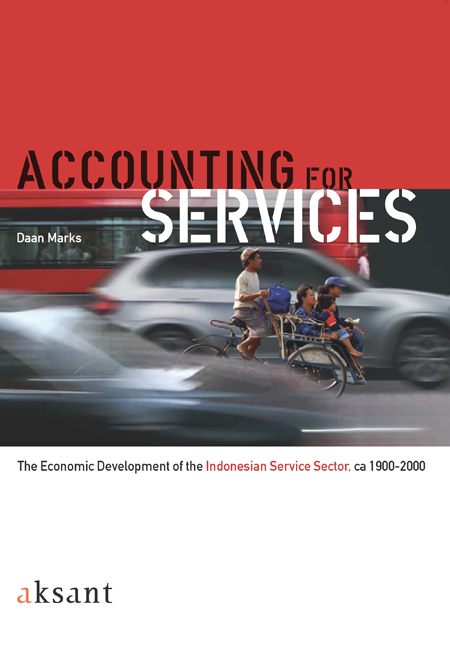Book contents
- Frontmatter
- Contents
- List of Tabels
- Acknowledgement
- 1 Introduction
- 2 National Accounting for Services in Indonesia
- 3 The Development of the Indonesian Service Sector: A Quantitative Analysis
- 4 Roads to Riches? Transportation and Economic Development in Indonesia
- 5 Involution and Growth: the Ambiguous Role of the Trade Sector in the Economic Development of Indonesia
- 6 Unity or Diversity?: Market Integration through Trade and Transport
- 7 Conclusions
- Appendices
- References
6 - Unity or Diversity?: Market Integration through Trade and Transport
Published online by Cambridge University Press: 19 January 2021
- Frontmatter
- Contents
- List of Tabels
- Acknowledgement
- 1 Introduction
- 2 National Accounting for Services in Indonesia
- 3 The Development of the Indonesian Service Sector: A Quantitative Analysis
- 4 Roads to Riches? Transportation and Economic Development in Indonesia
- 5 Involution and Growth: the Ambiguous Role of the Trade Sector in the Economic Development of Indonesia
- 6 Unity or Diversity?: Market Integration through Trade and Transport
- 7 Conclusions
- Appendices
- References
Summary
INTRODUCTION
The motto of Indonesia is Bhinneka Tunggal Ika, which is Old Javanese and is often loosely translated as ‘Unity in Diversity’. Literally it means ‘(Although) in pieces, yet One’. Whether this slogan can be applied to Indonesia's economy is debatable. It is clear that in Indonesia the emergence of an integrated national economy has been a slow and on-going evolutionary process. Dick et al. (2002: 10) argue that the structure of a national economy came into being only during the presidency of Suharto. They base this finding mainly on the fact that inter-island trade has only risen significantly since the late 1960s (Dick et al. 2002: 24-32). But an increase in inter-island trade is only suggestive evidence of the creation of a ‘national economy’. This chapter aims to give a more satisfactory answer to this question by assessing the process of market integration in Indonesia during the twentieth century using rice price series for a number of cities across the archipelago. In this way it is possible to evaluate whether developments in the two largest service sectors, i.e. trade and transport as discussed in the preceding two chapters, have enhanced economic development. The reasoning behind this is that increased efficiency in these sectors is a necessary, but not sufficient condition for economic development. Only when efficient and affordable transport and trade networks result in integrated and efficient markets can an economy develop to its full potential. Therefore this chapter assesses to what extent the developments in the transport and trade sectors indeed resulted in integrated and efficient markets in Indonesia in the twentieth century.
As an instrument to measure market efficiency and market integration I will make use of rice price series, not only because these are relatively abundant for a number of cities across the archipelago and covering more or less the whole twentieth century, but also because rice plays a central role in Indonesia's economy. Therefore stable rice prices through an integrated market, which is facilitated by efficient transport and trade networks, can be considered of crucial importance for economic development in Indonesia .
Rice production accounted for about 50 per cent of total value added in agriculture throughout the twentieth century (Van der Eng 1996b: 259-263).
- Type
- Chapter
- Information
- Accounting for ServicesThe Economic Development of the Indonesian Service Sector, ca 1900–2000, pp. 159 - 182Publisher: Amsterdam University PressPrint publication year: 2009



